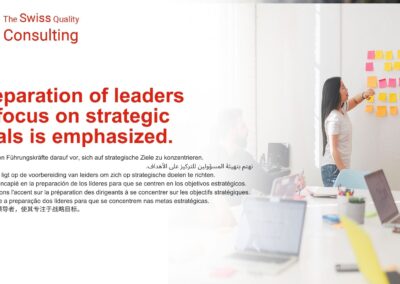The Strategic Importance of Adopting Sustainable Business Practices
Embracing Sustainability for Long-Term Success
The adoption of sustainable business practices is becoming increasingly crucial as companies worldwide prepare for a future centered around environmental responsibility. This approach involves integrating eco-friendly methods and renewable energy solutions into business operations, aligning corporate strategies with sustainability goals. For executives and entrepreneurs in Saudi Arabia and the UAE, this is not just a trend but a strategic necessity that offers significant long-term benefits.
In cities like Riyadh and Dubai, where economic diversification and innovation are key to future growth, incorporating sustainable practices can enhance corporate reputation, attract investment, and ensure compliance with evolving regulations. Sustainable business practices often involve optimizing resource use, reducing waste, and implementing energy-efficient technologies. For instance, the use of renewable energy sources such as solar and wind power can significantly lower operational costs and carbon footprints.
Furthermore, businesses that embrace sustainability are better positioned to meet the expectations of increasingly environmentally conscious consumers and stakeholders. In the context of Saudi Arabia’s Vision 2030 and the UAE’s National Strategy for Sustainability, companies that proactively adopt green practices will stand out in a competitive market. By focusing on sustainability, businesses can not only contribute to global environmental goals but also achieve substantial economic and strategic advantages.
Renewable Energy Solutions: A Key Component of Sustainability
One of the most impactful aspects of sustainable business practices is the adoption of renewable energy solutions. These solutions are essential for reducing reliance on fossil fuels and minimizing environmental impact. In the context of Saudi Arabia and the UAE, which are investing heavily in renewable energy infrastructure, businesses have a unique opportunity to integrate these solutions into their operations.
Solar energy, for instance, has become a prominent renewable resource in these regions, thanks to their high solar irradiance. By investing in solar panels and other renewable energy technologies, businesses can not only reduce their energy costs but also enhance their sustainability credentials. Similarly, wind energy projects are gaining traction, contributing to a more diversified and resilient energy portfolio.
Incorporating renewable energy solutions also aligns with global trends towards decarbonization and sustainability. Businesses that adopt these technologies are better prepared to navigate regulatory changes, meet emission reduction targets, and respond to market demands for greener products and services. This proactive approach can lead to increased operational efficiency, cost savings, and a stronger market position.
Leadership and Innovation in Sustainable Business Practices
Effective leadership is crucial for driving the adoption of sustainable business practices. Business executives and managers play a pivotal role in setting sustainability goals, implementing green initiatives, and fostering a culture of environmental responsibility. In regions like Riyadh and Dubai, where sustainability is a high priority, strong leadership is essential for guiding businesses through the complexities of environmental stewardship.
Executive coaching services can be instrumental in developing the skills needed for effective leadership in sustainability. These services can help leaders understand the strategic value of sustainability, develop actionable plans, and inspire their teams to embrace green practices. By equipping leaders with the knowledge and tools to drive sustainability, businesses can achieve their environmental goals and build a more resilient and innovative organization.
Furthermore, fostering a culture of innovation is key to sustaining progress in sustainable business practices. Encouraging employees to explore new technologies, collaborate on green initiatives, and continuously improve processes can lead to significant advancements in environmental performance. In this regard, investing in modern technology and supporting innovative approaches are vital for maintaining a competitive edge in a rapidly evolving market.
Integrating Sustainability into Business Strategy and Operations
Building a Sustainable Business Framework
Integrating sustainable practices into business strategy involves creating a comprehensive framework that addresses environmental, social, and economic dimensions. This framework should outline clear sustainability goals, metrics for performance measurement, and strategies for achieving targets. In Saudi Arabia and the UAE, where sustainability is a key focus for national development, establishing such a framework is essential for aligning business operations with broader environmental objectives.
Developing a sustainable business framework includes setting ambitious yet achievable goals, such as reducing greenhouse gas emissions, minimizing waste, and improving resource efficiency. Companies should also invest in technologies that support these goals, such as energy management systems and waste recycling programs. By establishing a robust framework, businesses can ensure that their sustainability efforts are systematic, measurable, and aligned with their long-term objectives.
Additionally, engaging with stakeholders, including employees, customers, and suppliers, is crucial for the successful implementation of sustainable practices. Transparent communication and collaboration with stakeholders can enhance trust, foster innovation, and drive collective efforts towards common sustainability goals. This holistic approach can lead to more effective and impactful sustainability initiatives.
Monitoring and Reporting on Sustainability Performance
Monitoring and reporting on sustainability performance are critical components of effective environmental stewardship. Businesses must track their progress towards sustainability goals, measure the impact of their initiatives, and report on their achievements and challenges. This process not only helps in identifying areas for improvement but also demonstrates accountability and transparency to stakeholders.
In Saudi Arabia and the UAE, where regulatory frameworks for sustainability are evolving, businesses are increasingly required to report on their environmental performance. Developing comprehensive reporting mechanisms that align with international standards and local regulations can enhance credibility and compliance. These mechanisms should include regular audits, performance assessments, and public disclosures that provide insights into the company’s sustainability efforts and outcomes.
Furthermore, leveraging technology for data collection and analysis can improve the accuracy and efficiency of sustainability reporting. Tools such as environmental management systems and data analytics platforms can provide valuable insights and support informed decision-making. By integrating these tools into their operations, businesses can enhance their sustainability performance and ensure that they are meeting their environmental commitments.
Conclusion: Embracing Sustainability for a Resilient Future
The adoption of sustainable business practices and renewable energy solutions is essential for preparing businesses for a future focused on environmental responsibility. By integrating these practices into their strategies and operations, companies can achieve significant economic and strategic benefits while contributing to global sustainability goals.
In regions like Saudi Arabia and the UAE, where sustainability is a central focus of national development, embracing sustainable practices offers a competitive advantage and aligns with broader environmental objectives. Effective leadership, innovation, and strategic planning are key to successfully navigating the complexities of sustainability.
As businesses continue to evolve in response to environmental challenges and opportunities, a commitment to sustainability will be crucial for long-term success. By adopting and implementing sustainable business practices, companies can build a more resilient and responsible future for themselves and the world.
#SustainableBusinessPractices #RenewableEnergy #EnvironmentalResponsibility #SaudiArabia #UAE #Riyadh #Dubai #ModernTechnology #BusinessSuccess #Leadership #ProjectManagement































